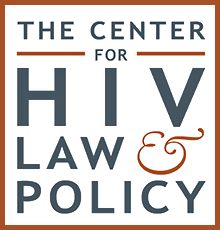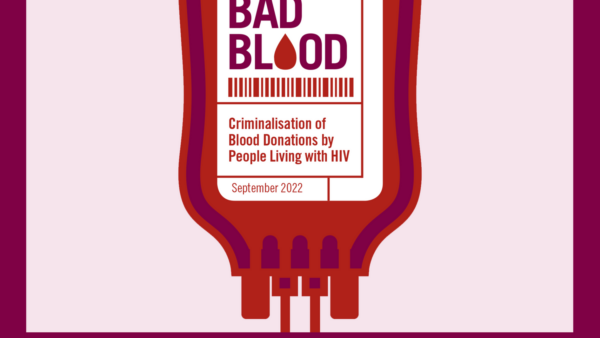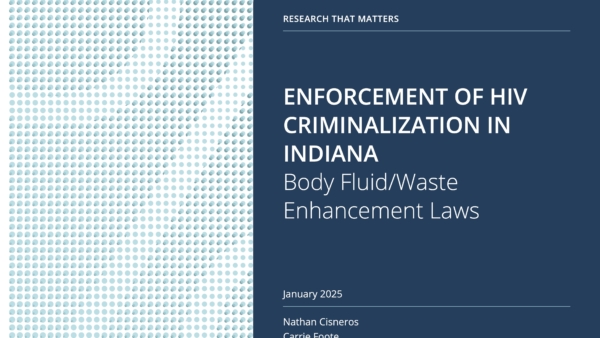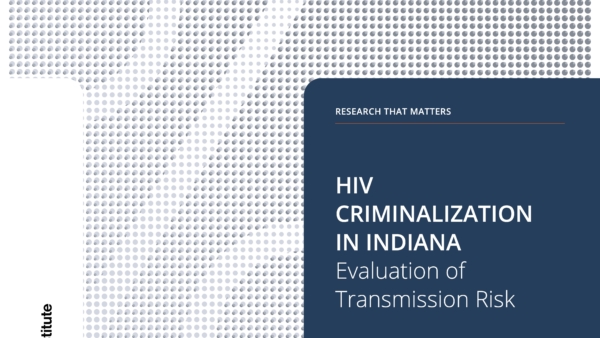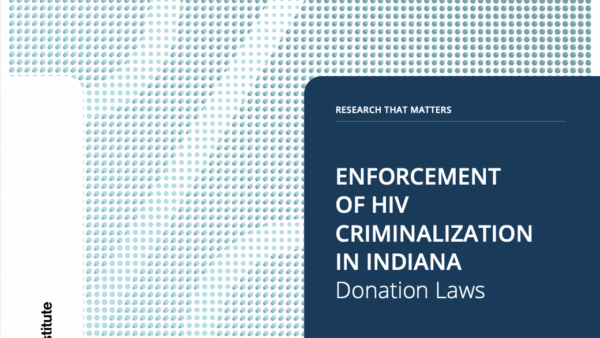Overview
Indiana has a complex range of HIV-specific criminal laws across both the state Criminal and Health Codes. These laws were introduced in the late 1980s and 90s, and despite criticisms, they have not significantly changed since then; however a review is underway which could see the law reformed.
The Indiana Health Code criminalises non-disclosure of HIV and Hepatitis B to sexual and needle-sharing partners where that person is aware of their status and engages in conduct that has been ‘epidemiologically demonstrated’ to carry a significant risk of transmitting either virus. This places a duty to inform partners on all people living with HIV (and Hepatitis B). Knowingly or intentionally breaching this duty is a felony offence punishable by up to three years’ imprisonment and a fine, with each day of non-disclosure constituting a new offence. No requirement of transmission is included in the provision.
The conduct prohibited under this provision is not specified in the text and instead is based on the US Center for Disease Control and Prevention’s (CDC) understanding of ‘high risk’ activity. It is clear that this would include anal and vaginal sex and the sharing of needles, while activities such as oral sex and biting are recognised by the CDC not to represent a significant risk of transmission. While the CDC’s guidance notes that preventative measures such as the use of condoms and adherence to medication reducing viral load significantly lowers the risk of transmission, the law does not explicitly account for this. The lack of clarity in this provision leaves open the possibility of criminalisation of conduct not normally considered ‘high risk’.
Perceived ‘exposure’ to HIV (as well as hepatitis and tuberculosis) through bodily fluids is also criminalised under provisions in the Criminal Code on ‘battery’, which prohibits knowing or intentional ‘exposure’ by placing a fluid on another person, and ‘malicious mischief’, which prohibits reckless, knowing or intentional ‘exposure’ by placing a fluid in a place with intent that another person will involuntarily touch or ingest it. The base sentence for both offences is up to 180 days’ imprisonment and a fine, increased to up to two and a half years’ imprisonment and a fine if the fluid contains HIV. The penalty for the battery offence can be increased to up to six years’ imprisonment and a fine if directed at a public safety official, and up to 12 years’ imprisonment and a fine for malicious mischief if the ‘exposure’ results in HIV transmission. The types of bodily fluids encompassed under these two provisions includes those from which HIV is not known to be transmitted, such as saliva, sweat, and urine. In an analysis published in January 2025, the Williams Institute found 51 cases of alleged HIV ‘exposure’ under the bodily fluids provisions involving 42 individuals. None of these cases involved alleged HIV transmission or any HIV transmission risk. These data cover the years from 2012-2023, and enforcement was found to have increased over time. While men were overrepresented among accused. A total of 25 cases ended in conviction.
The donation, sale or transfer of blood or semen which carries HIV is also criminalised under both the Criminal Code and Health Code. The base penalty is up to six years’ imprisonment and a fine, increased to a maximum of 12 years’ imprisonment and a fine if the act results in transmission. There is no requirement of transmission. Donation of blood or semen for research purposes is excluded from this offence (see our report, Bad Blood, for a global analysis of the criminalisation of blood donations). A 2024 analysis by the Williams Institute found that there were 18 cases brought under the donation laws, all of which involved attempts to donate at a plasma centre. Black defendants were significantly overrepresented in these cases. In 16 cases, a conviction was secured, the highest rate under donation laws of any US state. However, there have been no cases since 2019, suggesting a slowdown in enforcement.
Doctors providing care for people living with HIV are also set certain obligations. They are required to explain to them their duty to inform partners, and are authorised to inform health officials and partners of the person living with HIV of their status if they believe there is a present risk of transmission. Failure to comply with this provision is a misdemeanour offence. Additionally, medical records may be accessed to aid prosecution, and enforced quarantine can be imposed on people living with HIV.
In addition to these specific offences, people living with HIV have been convicted under general criminal laws, including a 1989 conviction for attempted murder. The presence of an STI, including HIV, is also considered an aggravating factor in ‘child molestation’ offences, resulting in enhanced sentences.
It is not clear exactly how many HIV criminalisation cases have occurred in Indiana. A 2021 analysis of law enforcement data found that 185 people had court contact between 2009 and 2021 based on their disease status, but it is not clear how many of these relate to HIV as the data includes hepatitis and tuberculosis cases. Almost 80% of these cases fell under the battery provision, such as two cases reported in 2019 (January and February) involving spitting which carries no risk of transmission. There were 34 people who had contact under the non-disclosure offence, all of which were living with HIV. A small number of people were charged under the malicious mischief provision, as well as the offence prohibiting donation of blood or semen, including two cases in 2014 and 2015. In terms of demographics, 70% of those arrested were men, while almost 30% were people of colour, which is significantly higher than the non-white population in Indiana.
Further research by our partners at the HIV Modernisation Movement in Indiana (see more about the Movement below) has revealed that of the 20 people known to have faced charges under the blood donation laws, 16 were black, demonstrating that this law has an even more disproportionate impact. This research also found that all 20 cases stemmed from public health officials reporting individuals to police following visits to plasma centres. Following the intervention of the Movement, the policy of reporting incidents to police has been revoked and there have been no known cases since.
In 2016 the HIV Modernization Movement was established to advocate for reform of Indiana’s HIV laws. The coalition is made up of local people living with HIV, as well as allies in medicine, public health, law and the wider community. The Movement does not advocate for full repeal, but modernisation of these laws, allowing space for criminalisation where there is an appropriate legal intention.
In May 2022 a broad review of Indiana’s Criminal Code was announced with a view to modernising the laws on HIV. A panel to review these laws met in the summer of 2022, and in October 2022 the panel unanimously recommended the repeal of most HIV laws in Indiana, finding them to be “unnecessarily discriminatory” and stating that they “don’t accomplish anything”. The panel recommended that only attempts at deliberate transmission should remain a crime. Whether these recommendations will be adopted by lawmakers remains to be seen, and recent attempts have mostly failed.
In 2021, House Bill 1340 was adopted, replacing stigmatising language in the law with more humanising language. However, other reform attempts have been less successful. A Bill was introduced in the House of Representatives in January 2022 which would repeal the criminal offences relating to the donation, sale or transfer of blood or semen, and remove HIV from the scope of the battery and malicious mischief offences (making them applicable only to hepatitis and tuberculosis). Another Bill, which would decriminalise non-disclosure and change the existing rules around notifying the health authorities of someone’s HIV status, was passed by the House. Ultimately both Bills failed to be adopted. In January 2023, the state House passed Bill 1198 which would have partially modernised Indiana’s HIV laws, removing the HIV sentence enhancement for the battery and malicious mischief provisions, and repealing the offence of ‘transferring contaminated bodily fluids’. Although the Bill had bipartisan support in the House, it died in the Senate and did not progress.
For a detailed analysis of HIV criminalisation in Indiana, as well as all other US states, see the Center for HIV Law and Policy report, HIV Criminalisation in the United States: a Sourcebook on State and Federal HIV Criminal Law and Practice.
Laws
Indiana Code § 16-41-7-1
Individual With a Communicable Disease’s Duty to Inform Persons at Risk
1. (a) This section applies to the following serious communicable diseases:
(1) Human immunodeficiency virus (HIV).
(2) Hepatitis B.
[…]
(d) Individuals with a communicable disease who know of their status as an individual with a communicable disease and have a serious communicable disease described in subsection (a) have a duty to inform or cause to be notified by a third party a person at risk of the following:
(1) The individual with a communicable disease’s disease status.
(2) The need to seek health care such as counseling and testing.
Indiana Code § 35-45-21-3
Failure of Individuals With Serious Communicable Diseases to Inform Persons at Risk
3. (a) A person who recklessly violates or fails to comply with IC 16-41-7 commits a Class B misdemeanor.
(b) A person who knowingly or intentionally violates or fails to comply with IC 16-41-7-1 commits a Level 6 felony.
(c) Each day a violation described in this section continues constitutes a separate offense.
Indiana Code § 35-42-2-1
Battery
(…)
(c) Except as provided in subsections (d) through (k), a person who knowingly or intentionally:
(1) touches another person in a rude, insolent, or angry manner; or
(2) in a rude, insolent, or angry manner places any bodily fluid or waste on another person;
commits battery, a Class B misdemeanor.
(…)
(f) The offense described in subsection (c)(2) is a Level 6 felony if the person knew or recklessly failed to know that the bodily fluid or waste placed on another person was infected with hepatitis, tuberculosis, or human immunodeficiency virus.
(…)
(h) The offense described in subsection (c)(2) is a Level 5 felony if:
(1) the person knew or recklessly failed to know that the bodily fluid or waste placed on another person was infected with hepatitis, tuberculosis, or human immunodeficiency virus; and
(2) the person placed the bodily fluid or waste on a public safety official.
Indiana Code § 35-45-16-2
Malicious Mischief
(…)
(c) A person who recklessly, knowingly, or intentionally places human:
(1) body fluid; or
(2) fecal waste;
in a location with the intent that another person will involuntarily touch the body fluid or fecal waste commits malicious mischief, a Class B misdemeanor.
(d) An offense described in subsection (c) is a
(1) Level 6 felony if the person knew or recklessly failed to know that the body fluid or fecal waste was infected with:
(A) infectious hepatitis;
(B) HIV; or
(C) tuberculosis;
(2) Level 5 felony if:
(A) the person knew or recklessly failed to know that the body fluid or fecal waste was infected with infectious hepatitis and the offense results in the transmission of infectious hepatitis to the other person; or
(B) the person knew or recklessly failed to know that the body fluid or fecal waste was infected with tuberculosis and the offense results in the transmission of tuberculosis to the other person; and
(3) Level 4 felony if:
(A) the person knew or recklessly failed to know that the body fluid or fecal waste was infected with HIV; and
(B) the offense results in the transmission of HIV to the other person.
(e) A person who recklessly, knowingly, or intentionally places human:
(1) body fluid; or
(2) fecal waste;
in a location with the intent that another person will ingest the body fluid or fecal waste commits malicious mischief with food, a Class A misdemeanor.
(f) An offense described in subsection (e) is:
(1) a Level 6 felony if the person knew or recklessly failed to know that the body fluid or fecal waste was infected with:
(A) infectious hepatitis;
(B) HIV; or
(C) tuberculosis;
(2) a Level 5 felony if:
(A) the person knew or recklessly failed to know that the body fluid or fecal waste was infected with infectious hepatitis and the offense results in the transmission of infectious hepatitis to the other person; or
(B) the person knew or recklessly failed to know that the body fluid or fecal waste was infected with tuberculosis and the offense results in the transmission of tuberculosis to the other person; and
(3) a Level 4 felony if:
(A) the person knew or recklessly failed to know that the body fluid or fecal waste was infected with HIV; and
(B) the offense results in the transmission of HIV to the other person.
Indiana Code § 35-45-21-1
Transferring Contaminated Body Fluids
1. (a) As used in this section, “blood” has the meaning set forth in IC 16-41-12-2.5.
(b) A person who recklessly, knowingly, or intentionally donates, sells, or transfers blood or semen for artificial insemination (as defined in IC 16-41-14-2) that contains the human immunodeficiency virus (HIV) commits transferring contaminated body fluids, a Level 5 felony.
(c) However, the offense under subsection (b) is a Level 3 felony if it results in the transmission of the human immunodeficiency virus (HIV) to any person other than the defendant.
Indiana Code § 16-41-14-17
Donation, Sale, or Transfer of HIV Infected Semen; Penalties
17. (a) This section does not apply to a person who transfers for research purposes semen that contains antibodies for the human immunodeficiency virus (HIV).
(b) A person who, for the purpose of artificial insemination, recklessly, knowingly, or intentionally donates, sells, or transfers semen that contains antibodies for the human immunodeficiency virus (HIV) commits transferring contaminated semen, a Level 5 felony. The offense is a Level 4 felony if the offense results in the transmission of the virus to another person.
Further resources
Not all laws used to prosecute people living with HIV in this state are included on this page. For a comprehensive overview and analysis of HIV-related criminal and similar laws and policies, visit The Center for HIV Law and Policy
